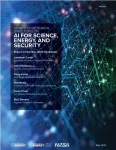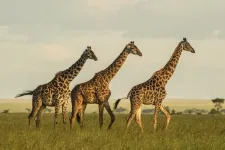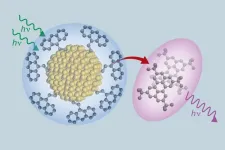(Press-News.org) Making an Advance Research Directive: An Interview Study with Adults Aged 55 and Older with Interests in Dementia Research
Nola M. Ries, Briony Johnston
Many people with dementia are interested in taking part in research, including when they no longer have capacity to provide informed consent. Advance research directives (ARD) enable people to document their wishes about research participation prior to becoming decisionally incapacitated. However, there are few available ARD resources. This Australian interview study elicited the views of people aged 55 years and older about the content of an ARD form and guidance booklet and processes to support research planning. Participants had interests in dementia research. All participants described the ARD materials as easy to understand, and all expressed willingness to take part in future research. Nearly half believed that an ARD should be legally enforceable, while others saw it as a nonbinding document to guide decisions about their participation in research. Close family members were preferred as proxy decision-makers. The ARD form and guidance booklet may be adapted for use elsewhere.
Offering Lottery Entry as an Incentive for Research Participation Compromises Informed Consent
Simon Paul Jenkins
This paper argues that offering entry into a lottery as an incentive to those who participate in research studies represents a challenge to the principle of informed, coercion-free consent that is considered an essential ingredient of permissible recruitment to studies. This is, first, because information about the chances of winning in this context is normally unavailable to potential participants and, without this, they cannot accurately weigh up the risks and potential benefits of participation. Second, even when this information is available, such an incentive capitalizes, I contend, on the difficulty of weighing up small probabilities, exploiting the fact that people tend to be beset by cognitive biases that make it challenging to make decisions rationally. The resulting conclusion is that we should not view lotteries as more ethical than simply paying participants, when the latter is feasible.
Also in this issue:
A Competency Framework for Health Research Ethics Educational Programs: Results from a Stakeholder‐Driven Mixed‐Method Process
Sean Tackett, Chirk Jenn Ng, Jeremy Sugarman, Esther Gnanamalar Sarojini Daniel, Nishakanthi Gopalan, Tivyashinee, Adeeba Kamarulzaman, Joseph Ali
Translational Bioethics and Health Privacy
Mark A. Rothstein
Table of Contents • Advance research directives • Translational research ethics: Ethics & Human Research: Vol 45, No 3 (wiley.com)
For more information, contact:
Susan Gilbert
Director of Communications
The Hastings Center
845-424-4040 x244
gilberts@thehastingscenter.org.
END
Ethics & Human Research, May-June 2023
Advance research directives, research participation lottery, and more
2023-06-12
ELSE PRESS RELEASES FROM THIS DATE:
Visionary report unveils ambitious roadmap to harness the power of AI in scientific discovery
2023-06-12
Innovations in artificial intelligence (AI) are rapidly shaping our world, from virtual assistants and chatbots to self-driving cars and automated manufacturing. Seizing on the potential of AI to transform science, the nation’s leading experts in science and technology have released a blueprint for the United States to accelerate progress by expanding its capabilities in AI and big data analysis.
“AI for Science, Energy, and Security” lays out a comprehensive vision ...
Masai giraffes more endangered than previously thought
2023-06-12
UNIVERSITY PARK, Pa. — Giraffes in eastern Africa may be even more endangered than previously thought. A new study led by researchers at Penn State reveals that populations of Masai giraffes separated geographically by the Great Rift Valley have not interbred — or exchanged genetic material — in more than a thousand years, and in some cases hundreds of thousands of years. The researchers recommend that the two populations be considered separately for conservation purposes, with separate but coordinated conservation efforts to manage each population.
Populations of giraffes have declined rapidly in the last thirty years, with ...
WVU research shows how much pharmaceutical companies are capitalizing on rare drug incentives
2023-06-12
Drugs used to treat rare conditions are earning pharmaceutical companies almost as much as those marketed to the general public, according to a researcher at West Virginia University. Sean Tu, a College of Law professor found lucrative so-called “orphan” drugs earn manufacturing tax credits, have longer patent exclusivities and face easier Food and Drug Administration review.
Orphan drugs treat diseases that affect fewer than 200,000 Americans. In addition to tax credits, Congress has incentivized the pharmaceutical companies that manufacture orphan drugs with a waiver of ...
Planet orbiting 2 stars discovered using new technique
2023-06-12
COLUMBUS, Ohio – An international team of astronomers is the first to apply an old technique to discover a new type of planet that orbits two stars – what is known as a circumbinary planet.
As an added bonus, researchers found a second planet that is orbiting the same two stars, which is only the second confirmed multi-planet circumbinary system found to date. The study was published today in the journal Nature Astronomy.
Circumbinary planets were once relegated to only science fiction, but thanks to data collected from NASA’s Kepler mission, astronomers now know that multiple star systems are ...
Railways could be a key 'utility player' for backup power
2023-06-12
– By Christina Nunez
The U.S. electric grid faces simultaneous, evolving pressures. Demand for power from the grid is increasing as people adopt electric cars and building energy is transitioned from gas to electricity. At the same time, climate change is driving more extreme weather. Events like the 2020 heat wave that led to rolling blackouts in California are relatively infrequent, but they are happening more often – and utilities need to be ready for them.
New research points to a flexible, cost-effective option for backup power when trouble strikes: batteries aboard trains. A study from the U.S. Department of Energy’s Lawrence Berkeley National Laboratory ...
Hines studying male victims of intimate partner violence in racial/ethnic minority communities
2023-06-12
Denise Hines, Associate Professor, Social Work, received funding for the study: "Understanding Male Intimate Partner Violence Victims from Racial/Ethnic Minority Communities."
Hines will lead a four-phase study on the experiences of male victims of intimate partner violence, with a specific focus on men from racial/ethnic minority communities.
She will conduct the study in four, simultaneous phases.
In Phase 1, Hines will conduct a survey study of male Intimate Partner Violence (IPV) victims, including 300 White men, 300 Black men, and 600 Latino men from both immigrant and non-immigrant communities within the United States. The survey will ...
Becker receives funding for scientific support in solar physics
2023-06-12
Peter Becker, Professor of Astrophysics and Space Sciences, received funding for: "Scientific Support in Solar Physics, Remote Sensing, Space Weather, High-Energy Astrophysics, and Associated Scientific Fields."
As part of this project, Mason researchers will conduct research in collaboration with the Naval Research Laboratory (NRL).
Areas covered by this research include: space sciences research (encompassing solar physics and studies of the integrated Sun-Earth system); computational physics and computational fluid dynamics; high-energy astrophysics; instrumentation ...
Baldimtsi conducting collaborative research focused on cryptographic accumulators and revocation of credentials
2023-06-12
Foteini Baldimtsi, Assistant Professor, Computer Science, received funding from the National Science Foundation for the project: "Collaborative Research: SaTC: CORE: Medium: Cryptographic accumulators and revocation of credentials."
The goal of the project is to design efficient revocation mechanisms for the Web PKI and beyond.
Baldimtsi and her collaborators will tailor cryptographic accumulators to the problem of credential revocation making certificate revocation mechanisms ...
Mason researchers receive funding for collaborative mobile immersive computing research infrastructure for multi-user XR
2023-06-12
Four Mason researchers received funding from the National Science Foundation for the project: "Collaborative Research: CCRI: New: CoMIC: A Collaborative Mobile Immersive Computing Research Infrastructure for Multi-user XR."
Bo Han, Associate Professor, Computer Science; Parth Pathak, Assistant Professor, Computer Science; Lap-Fai (Craig) Yu, Associate Professor, Computer Science; and Songqing Chen, Professor, Computer Science, are designing and developing the infrastructure for Collaborative ...
New material transforms light, creating new possibilities for sensors
2023-06-12
A group of scientists and engineers that includes researchers from The University of Texas at Austin have created a new class of materials that can absorb low energy light and transform it into higher energy light. The new material is composed of ultra-small silicon nanoparticles and organic molecules closely related to ones utilized in OLED TVs. This new composite efficiently moves electrons between its organic and inorganic components, with applications for more efficient solar panels, more accurate medical imaging and better night vision goggles.
The material is described in a new paper in Nature Chemistry.
“This process gives us a whole new way of designing ...
LAST 30 PRESS RELEASES:
$3 million NIH grant funds national study of Medicare Advantage’s benefit expansion into social supports
Amplified Sciences achieves CAP accreditation for cutting-edge diagnostic lab
Fred Hutch announces 12 recipients of the annual Harold M. Weintraub Graduate Student Award
Native forest litter helps rebuild soil life in post-mining landscapes
Mountain soils in arid regions may emit more greenhouse gas as climate shifts, new study finds
Pairing biochar with other soil amendments could unlock stronger gains in soil health
Why do we get a skip in our step when we’re happy? Thank dopamine
UC Irvine scientists uncover cellular mechanism behind muscle repair
Platform to map living brain noninvasively takes next big step
Stress-testing the Cascadia Subduction Zone reveals variability that could impact how earthquakes spread
We may be underestimating the true carbon cost of northern wildfires
Blood test predicts which bladder cancer patients may safely skip surgery
Kennesaw State's Vijay Anand honored as National Academy of Inventors Senior Member
Recovery from whaling reveals the role of age in Humpback reproduction
Can the canny tick help prevent disease like MS and cancer?
Newcomer children show lower rates of emergency department use for non‑urgent conditions, study finds
Cognitive and neuropsychiatric function in former American football players
From trash to climate tech: rubber gloves find new life as carbon capturers materials
A step towards needed treatments for hantaviruses in new molecular map
Boys are more motivated, while girls are more compassionate?
Study identifies opposing roles for IL6 and IL6R in long-term mortality
AI accurately spots medical disorder from privacy-conscious hand images
Transient Pauli blocking for broadband ultrafast optical switching
Political polarization can spur CO2 emissions, stymie climate action
Researchers develop new strategy for improving inverted perovskite solar cells
Yes! The role of YAP and CTGF as potential therapeutic targets for preventing severe liver disease
Pancreatic cancer may begin hiding from the immune system earlier than we thought
Robotic wing inspired by nature delivers leap in underwater stability
A clinical reveals that aniridia causes a progressive loss of corneal sensitivity
Fossil amber reveals the secret lives of Cretaceous ants
[Press-News.org] Ethics & Human Research, May-June 2023Advance research directives, research participation lottery, and more




